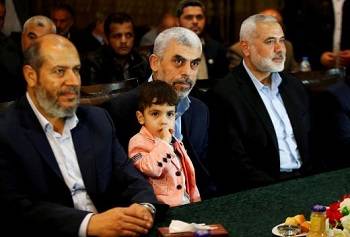Hamas has agreed to talks with the rival Fatah movement and expressed its willingness to hold general elections in the Palestinian territories.
In a statement issued on Sunday, Hamas said it has accepted key conditions set by President Mahmoud Abbas, and dissolved what is known as the Gaza administrative committee.
The committee, which was announced in March, was viewed by the PA as a parallel government to Abbas' Palestinian Authority, though some Hamas officials refuted this.
Hamas said it formed the committee after the consensus government failed to take responsibility for Gaza's administration.
In recent months, the PA stepped up its actions to pressure Hamas into forfeiting control of the territory by cutting the salaries of its employees living in Gaza and reducing electricity supply to the Strip.
The Palestinian Authority, controlled by Fatah, fought a war with Hamas in 2007.
In parliamentary elections a year earlier, Hamas defeated Mahmoud Abbas' long-dominant Fatah party. Hamas then pushed Fatah out of the Strip after the latter refused to recognize the vote's results. Since 2007, the Palestinian leadership has been divided between two rival governments, with Hamas controlling Gaza and Abbas in charge of autonomous enclaves in the Israeli-occupied West Bank.
Repeated attempts at reconciliation have failed.
In its Sunday statement, Hamas invited an Abbas-led unity government to return to Gaza and said it was ready to enter talks with Fatah.
"Hamas invites the consensus government to come to Gaza to practice its mission and carry out its duties in the Gaza Strip immediately, and it accepts holding the general elections," the statement said.
The unity government was formed in 2014, but has been unable to operate in Gaza until now.
'Encouraging'
A senior Fatah official welcomed the announcement, but said the group wants to see vows implemented before making the next move.
Mahmoud Aloul told the Voice of Palestine radio that the news was "encouraging". However, he cautioned "we want to see that happening on the ground before we move to the next step".
Hamas' decision came after separate talks by Hamas and Fatah delegations with Egyptian officials in Cairo in recent days.
The movement said it was "responding to the generous Egyptian efforts, which reflect the Egyptian desire to end the split and achieve reconciliation, and based on our desire to achieve national unity".
Egypt has been brokering talks with Fatah to implement a deal signed in 2011 in Cairo with Hamas to end their dispute and form an interim government before elections.
Al Jazeera’s Harry Fawcett, reporting from West Jerusalem, described the development as a "major change in stance by Hamas".
"This is all hinged on a new relationship between Hamas and Egypt, which came about after it changed the language of its charter in May, disassociating itself, in not so many words, from the Muslim Brotherhood."
A democratically elected Muslim Brotherhood government was overthrown by the Egyptian military in 2013 and the group has since been banned in the country.
Pressure on Hamas
Hamas has been weakened by an Israeli and Egyptian blockade, three wars with Israel and international isolation.
In March, Abbas stepped up pressure on Hamas after it formed the contentious committee that runs Gaza.
Despite Sunday's announcement, any reconciliation deal would still face many obstacles.
Political analyst Khalil Shaheen, said Hamas' step to dissolve the committee was "inevitable in light of the pressure from Fatah and all the other factions within the PLO".
"Hamas was isolated after it formed this committee. The pressure from Abbas against Gaza increased the already dire political and economic conditions in the Strip," Shaheen told Al Jazeera from his office in Ramallah.
However, dissolving the committee, said Shaheen, "does not mean that Hamas' is giving up control over the PA's institutions in Gaza" but that it is a step towards forming a unity government.
In previous deals, including the 2011 Egyptian-brokered agreement, both sides professed willingness to reconcile, but ultimately balked at giving up power in their respective territories.
A key sticking point in the past was Hamas' refusal to place its security forces in Gaza under the control of an Abbas-led unity government.
The Gaza Strip, a coastal enclave of some two million people, has faced deteriorating humanitarian conditions, with a severe electricity crisis and a lack of clean water, among other issues.
Gaza's economy is in tatters and it has one of the world's highest unemployment rates.
UN officials have urged Israel to lift its decade-long blockade of Gaza.
PHOTO CAPTION
Hamas leader Ismail Haniyeh (R) and Hamas Gaza Chief Yahya Al-Sinwar attend a ceremony announcing a new policy document. September 09, 2017
Al-Jazeera


 Home
Home Discover Islam
Discover Islam Quran Recitations
Quran Recitations Lectures
Lectures
 Fatwa
Fatwa Articles
Articles Fiqh
Fiqh E-Books
E-Books Boys & Girls
Boys & Girls  Ramadan
Ramadan Fatwa Audios
Fatwa Audios Month of Mercy
Month of Mercy Women
Women Eed Al- Fitr
Eed Al- Fitr Food Recipes
Food Recipes Videos
Videos

 Prayer Times
Prayer Times












